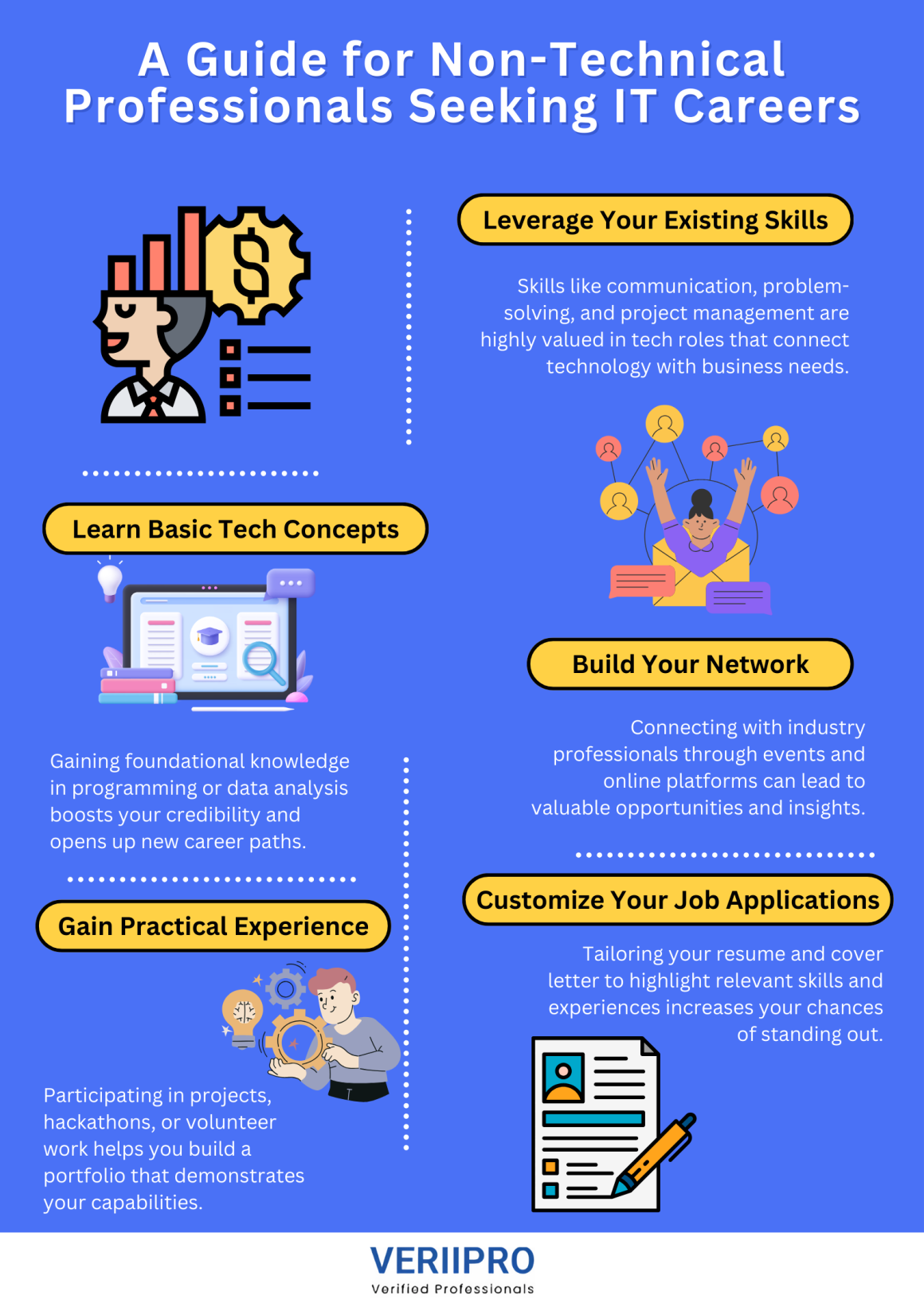How to Transition Into Tech: A Guide for Non-Technical Professionals Seeking IT Careers
Making a career shift can be both exciting and daunting, especially when you’re moving into a field as dynamic as technology. If you’re a non-technical professional eyeing a role in IT, you’re not alone—and the good news is that the tech industry is more accessible than you might think. This guide will walk you through practical steps to help you smoothly transition into a tech career.

Understand the Tech Landscape
First things first: get to know the lay of the land. The tech industry isn’t just about coding and engineering. It encompasses a wide range of roles that require diverse skill sets. Positions like project manager, business analyst, UX designer, and technical writer are integral parts of tech teams and often value skills from non-technical backgrounds.
A CompTIA report highlights that the tech sector is rapidly expanding, with a growing need for professionals who can bridge technology and business. This means your unique experiences and perspectives are not only welcome but needed.
Identify Your Transferable Skills
Take stock of what you bring to the table. Skills such as problem-solving, communication, project management, and critical thinking are highly valued in tech. For example, if you’ve been working in finance, your analytical skills and attention to detail can be a huge asset in roles like data analysis or cybersecurity.
An article in the Harvard Business Review emphasizes leveraging your existing skills to stand out. Your background can offer fresh insights that tech companies may not even realize they’re missing.
Learn the Basics of Technology
While you don’t need to become a coding guru overnight, familiarizing yourself with basic tech concepts can go a long way. Online platforms like Coursera and Codecademy offer courses in programming languages like Python or JavaScript, which are both beginner-friendly.
Earning certifications can also boost your credibility. For instance, a Project Management Professional (PMP) certification from the Project Management Institute is highly respected and can open doors to managerial roles in tech projects.
Network, Network, Network
You’ve probably heard it before, but networking truly is invaluable—especially when changing careers. Attend tech meetups, webinars, and industry conferences to meet professionals already in the field. Websites like Meetup and Eventbrite are great places to find events near you.
Don’t underestimate the power of LinkedIn either. Engage with content relevant to your desired field, join groups, and don’t be shy about reaching out to people for informational interviews. According to Forbes, many job opportunities are discovered through networking rather than traditional job searches.
Get Hands-On Experience
Nothing speaks louder than experience. Participate in hackathons, join open-source projects, or take on freelance gigs to build a portfolio. Platforms like GitHub allow you to contribute to projects and showcase your work to potential employers.
Volunteering is another excellent way to gain experience. Websites like VolunteerMatch list tech-related volunteer opportunities that can help you apply your skills while making a positive impact.
Tailor Your Resume and Cover Letter
When you’re ready to apply for jobs, make sure your resume and cover letter are tailored to the tech industry. Highlight your transferable skills and any tech-related experience you’ve gained. Use industry-specific keywords to help your application get past Applicant Tracking Systems (ATS). Resources like The Muse offer great tips on optimizing your resume for tech roles.
Remember to showcase your adaptability and eagerness to learn. Tech companies value candidates who are proactive and can grow with the team.
Consider Further Education
If you want to deepen your technical knowledge, consider enrolling in a bootcamp or even pursuing a degree in a tech-related field. Institutions like General Assembly and Flatiron School offer intensive programs in coding, data science, and more.
While this is a bigger commitment, it can provide you with structured learning and networking opportunities that might accelerate your career transition.
Stay Updated on Industry Trends
The tech world moves fast. Keeping up with the latest trends and developments can give you an edge. Subscribe to publications like TechCrunch or Wired to stay informed.
Understanding emerging technologies can also help you identify niche areas where your previous experience could be particularly valuable. For example, if you have a background in healthcare, knowledge about health tech innovations could make you a strong candidate for roles in that sector.
Conclusion
Switching careers into tech might seem challenging, but with the right approach, it’s absolutely achievable. By leveraging your existing skills, learning new ones, and actively networking, you can make a successful transition into the IT industry.
Looking for opportunities in the tech field? VeriiPro is here to help!








